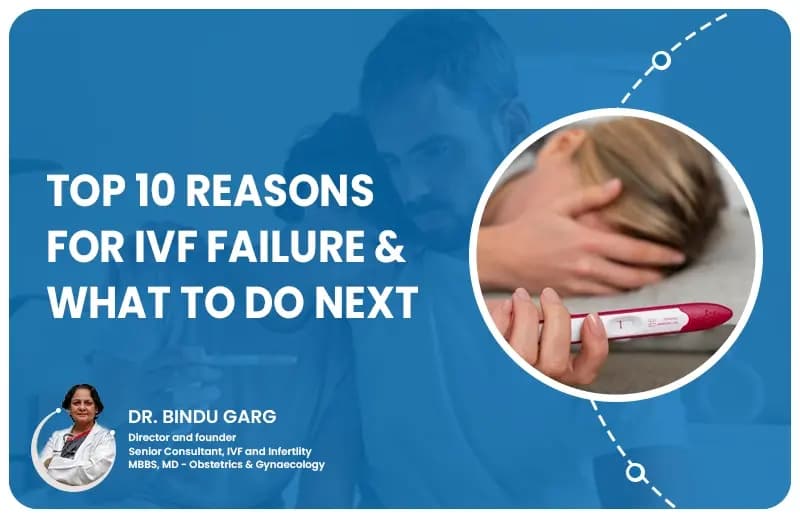
Top 10 Reasons For IVF Failure & What To Do Next
Undergoing in-vitro fertilization (IVF) is an emotional and physical journey for couples struggling with infertility. However, not all IVF cycles result in a successful pregnancy, which can leave you with many questions and doubts. If you have asked yourself, “Why did my IVF fail?” or “What should I do next after a failed IVF attempt?” you are not alone.
This blog will help you understand the common causes of IVF failure, what steps to take afterwards, and even address practical concerns such as “When do you get your period after a failed IVF cycle?”
Whether you are considering another IVF cycle or exploring other fertility options, this blog is here to provide guidance. With expert insight and simple explanations, we aim to ease your worries and prepare you for the next step in your fertility journey.
What is IVF and How Does It Work?
IVF is an advanced fertility treatment in which eggs are fertilized with sperm in a laboratory. The resulting embryos are then transferred to the uterus for implantation. Although IVF has a high success rate, many factors can affect its outcome.
Read Also:- Three Common Treatments for Infertility
Top 10 Reasons For IVF Failure
1. Poor Quality Eggs
Egg quality plays a vital role in successful fertilization. Women over the age of 35 or those with health issues often produce lower-quality eggs, leading to unsuccessful cycles.
2. Sperm Issues
Even with advanced techniques such as intracytoplasmic sperm injection (ICSI), poor sperm quality or DNA fragmentation can result in fertilization or implantation failure.
3. Embryo Quality
Not all embryos can develop into a healthy pregnancy. Chromosomal abnormalities or poor development can reduce the chances of implantation.
4. Uterine Lining Issues
A healthy uterine lining (endometrium) is essential for successful implantation. A thin or poorly developed lining can prevent the embryo from attaching.
5. Hormonal Imbalances
Irregularities in hormones like progesterone and estrogen can harm the IVF process, especially during the luteal phase when the embryo needs support to implant.
6. Lifestyle Factors
Smoking, excessive alcohol consumption, obesity and stress can significantly reduce the success rate of IVF. A healthy lifestyle before and during treatment is very important.
7. Advanced Maternal Age
Women over the age of 40 often face decreased IVF success rates due to a decline in ovarian reserve and egg quality.
8. Polycystic Ovary Syndrome (PCOS)
PCOS can complicate ovarian stimulation, resulting in poor egg quality or over-stimulation, which affects the outcome of IVF.
9. Immune System Issues
Sometimes, the immune system may mistakenly attack the embryo, preventing successful implantation.
10. Lab-Related Factors
Errors or inefficiencies in laboratory procedures such as embryo culturing or transfer can sometimes cause an IVF cycle to fail.
When Do You Get a Period After Failed IVF?
After a failed IVF cycle, most women get their period within 1-2 weeks. However, the timeline may vary depending on your body and the medications used during the cycle. If your period does not start within three weeks, consult your doctor to avoid complications.
Read Also:- Everything You Need to Know About Multiple Pregnancies
What To Do After a Failed IVF Cycle?
1. Analyze the Results
Talk to your fertility specialist to understand what went wrong. Tests such as genetic screening or hormonal analysis can provide information.
2. Consider Lifestyle Changes
Adopt a healthy lifestyle, including a balanced diet, regular exercise, and stress-reduction techniques such as yoga or meditation.
3. Explore Other Fertility Options
If several IVF attempts fail, consider options such as donor eggs, donor sperm or surrogacy.
4. Focus on Emotional Well-Being
Seek counselling or join support groups to deal with the emotional challenges of IVF failure.
5. Prepare for the Next Cycle
Take time to recover emotionally and physically before planning your next IVF cycle. Ask your doctor about changes in protocol that may improve success rates.
People Also Ask
Q: Can stress cause IVF failure?
Yes, stress can negatively impact hormonal balance, egg quality and overall IVF results.
Q: What tests are done after a failed IVF cycle?
Tests such as karyotyping, endometrial receptivity analysis (ERA), and embryonic genetic testing may be performed.
Q: Is it possible to succeed in the next IVF cycle after a failure?
Yes, many couples find success after modifying their treatment protocols and addressing underlying issues.
Why Does IVF Fail Even With Good Embryos?
Even with high-quality embryos, factors such as uterine abnormalities, hormonal imbalances, or immune system problems can lead to implantation failure. Sometimes, the cause may remain unclear.
How to Prevent IVF Failure?
- Choose a Reputable Clinic: Choose a clinic with advanced technology and experienced doctors.
- Opt for Preimplantation Genetic Testing (PGT): This ensures that only chromosomally normal embryos are transferred.
- Optimize Your Health: Maintain a healthy weight, quit smoking, and reduce alcohol consumption.
- Monitor Hormonal Levels: Ensure proper hormonal support during the luteal phase.
- Stay Informed: Regular conversations with your doctor can help you make informed decisions.
Conclusion
A failed IVF cycle can be frustrating, but it is not the end of your fertility journey. Understanding the reasons behind IVF failure and taking proactive steps can increase your chances of success in future attempts. Remember, there may be challenges on the road to becoming a parent, but with the right guidance and support, it is possible to fulfill your dream.
As the best IVF doctor in Gurgaon, we are here to help you every step of the way. Contact us today for expert advice and expert care according to your fertility needs.
Content Created By:

CyberBizz Technologies
Team - Content Curator